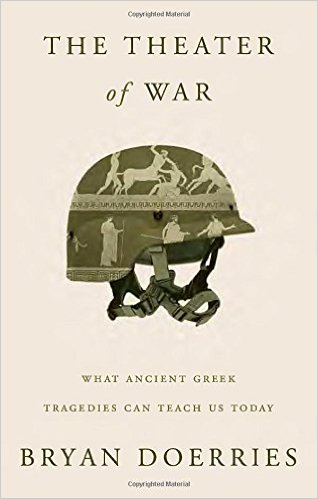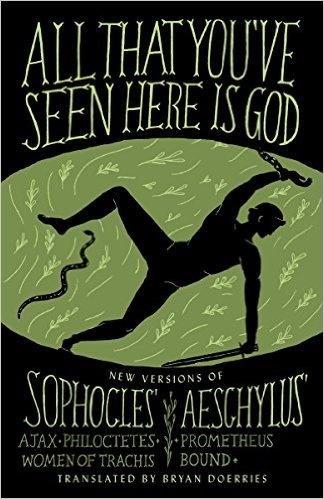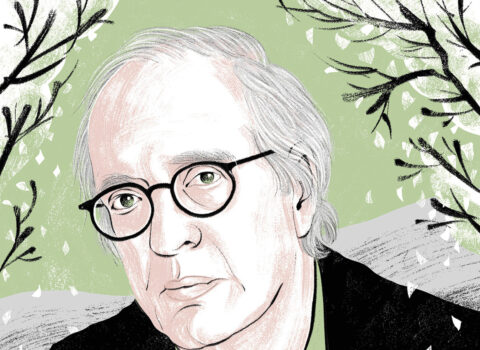Permission to Speak Frankly
“By committing to the great emotional extremes demanded by Greek tragedy,” says Brian Doerries, author of Theater of War, “the actors are in effect saying to the audience: 'If you want to match our emotional intensity, that would be fine.'”
In September, theater director, translator, and writer Bryan Doerries published The Theater of War, a memoir, and All That You’ve Seen Here is God, translations of four Greek plays by Sophocles and Aeschylus.
The events calendar at a liberal arts college can be overwhelming. There are guest lectures by visiting scholars and faculty lectures by colleagues; conferences on subjects of great cultural moment; student art shows and performances—dozens of opportunities for education, delight, and boredom. In February of 2012, at Bard College, where I teach, a colleague of mine, the classicist and writer James Romm, told me I might want to make time for an event called Acts of Violence. Described as a public health project that would present scenes from Seneca’s Thyestes, a Roman tragedy written during the reign of Nero, Acts of Violence was said to be “a catalyst for town hall discussions about the impact of political violence upon individuals, families, caregivers, health and human rights advocates, communities, and nations.” Because I have always harbored a private shame over not having become a classicist, pretty much anything that relates to the field I end up finding difficult to resist—even though the words “catalyst for town hall discussions” tend to make me want to go into hiding.
What unfolded that evening—an overwhelmingly powerful performance that did not so much catalyze as properly traumatize an audience of undergrads and professors into having a conversation as a community that was unlike any experience I’d had of theater before—changed the next several years of my life. I wrote about that experience in “You Are Not Alone Across Time,” which Harper’s Magazine published in October 2014.
At the center of that piece is Bryan Doerries, the creative director of Outside the Wire, a theater company that has been making such performances happen in schools, hospitals, prisons, and army bases around the world. Now with more than a dozen different projects underway, Outside the Wire attempts to reach communities in need—in need of conversation about what they’re dealing with or have been unable to.
This month, Doerries is publishing two books that relate to his work. A memoir, the superb and moving The Theater of War; and All That You’ve Seen Here is God, Doerries’s vigorous translations of four Greek plays by Sophocles and Aeschylus. And rather than attempting to characterize the nature of the power of Doerries’s work, here are seventy seconds of rehearsal video to give you a sense of what his company of actors can manage.
The video was shot early one morning in the conference room of a Hilton Garden Inn in Joplin, Missouri, in May 2012. Doerries and his colleagues were there to perform Steven Mitchell’s translation of The Book of Job on the one-year anniversary of the day a tornado destroyed much of the town. The actors—Arliss Howard, who played Red Sox owner John W. Henry in Moneyball; David Strathairn, best known as Edward R. Murrow in Good Night, and Good Luck; and Paul Giamatti—are reading from their scripts for the first time as a group. You’ll see Howard, who played a variety of roles, and Strathairn, who played God, watch as Giamatti, as Job, rails against God. The pleasure that Howard, a total pro, nonetheless couldn’t mask at the spectacle of an actor, as Doerries puts it, “going for broke,” is the kind of reaction that I’ve seen Doerries direct his actors to draw from unlikely audiences all around the world.
My conversation with Doerries follows.
In The Theater of War, you make a strong case against the interpretation of Sophocles’ plays—what they mean—in favor of coming to terms with what they do. Could you say a little about this idea of the plays’ meaning being something that exists outside interpretation and instead as something that is only experienced inside a theater?
One of the most powerful aspects of tragedy is its ability to move us out of our heads and into our guts. It’s not that the plays are meaningless, but they demand that we interpret them from within a heightened state of emotional awareness. People often say that they are “buzzing” after Theater of War performances. The plays are designed to do this, to move us from one cognitive state to another. And it’s only when people are vibrating and buzzing that the significance of Sophocles’ plays takes hold.
I’ve been witness to the way that your company’s performances—in Japan, in Kentucky, in Queens, at Quantico—do as you say. It’s very hard, I found in writing about your work, to convey precisely how that shift in cognitive states feels. It makes me wonder, as you sat down to write Theater of War, how you thought you’d confront the fundamentally performative nature of your work.
It was a real struggle. I knew it would be impossible to create an experience for the reader that would be analogous to that of an audience member at one of our performances. So the challenge was how to convey the spirit of the experience of tragedy, and of our projects, for readers, on the page. At first, I thought I was writing a straightforward book about tragedy, which would make an argument and support it with research and rhetoric. Then, about a year into the process, I realized that the only way to reach readers and touch them as we had touched audience members was to take the gloves off and reveal something very personal and vulnerable about my own life story. It felt like a big risk, but essential to moving readers out of their heads and into their guts, so they could receive the rest of the book in a different way.
Were you surprised that offering those more personal revelations—you discuss, very movingly, the loss of your father to renal failure and of your former girlfriend, Laura Rothenberg, to cystic fibrosis—was so difficult? I’ve watched you curate conversations around the world in which soldiers, before their superior officers and audiences of hundreds of enlisted men, confess to depression and alcoholism and their suicide attempts. Why is it so difficult for us to be frank about experience when, as Diogenes is said to have said, frankness is the most beautiful thing in human life?
If I had one word to describe the work we do it’s “permission.” How many different ways can we give you, the audience member, permission to come forward and talk openly about some of the darkest parts of your life? The greatest tool for giving people permission to speak frankly about painful experiences is risk. The actors take the risk of performing Greek tragedy at full tilt in front of highly resistant audiences, audiences that are often there under orders. By committing to the great emotional extremes demanded by Greek tragedy, the actors are in effect saying to the audience: “If you want to match our emotional intensity, that would be fine. You have our permission to go as far as we have gone.” Then, the community panelists take the risk of being the first people to speak, openly and honestly, after each performance. Finally, audience members who rise to the challenge of my questions and reveal harrowing personal stories that they’ve never told in private, let alone in front of 400 of their peers, take the risk of speaking, thereby giving others in the audience permission to follow their lead. The entire model is based upon risk.
To answer your question, I am rarely in the position of revealing something personal before an audience. At least, not at first. Also, whenever I do reveal something about myself, it’s within a community of people who are doing the same. Writing a book is an extremely solitary act, and choosing to reveal something confessional about parts of my life that were painful and difficult to revisit, alone, at my desk, seemed like far more of risk, simply because I was alone when I did it.
The reason we have such a hard time talking frankly and openly about painful experiences is that our existences are increasingly isolated and circumscribed. Rarely these days do we find ourselves surrounded by the comfort and support of a community of people who want to listen. That’s what the projects aim to generate: a community of listeners. And, in a certain way, I hoped to write a book that would engage readers as part of a larger community to which they belonged but with which, for whatever reasons, they had lost touch.
Do you think that books, broadly speaking, including the novel as a form of storytelling and nonfiction forms of argument, do a less successful job of managing the job that Ancient Greek theater seems to have—surrounding us, by the very nature of the form of its delivery, with community? Is there something essential that has been lost in our overwhelming reliance—prior to the birth of film as a storytelling medium—on the printed form of communication? I’m asking you overlook the obvious gains that the printed word has given to civilization and focus instead on what we don’t get if we don’t get the communal experience of dramatic art. I’m thinking of a moment in your book where Brigadier General Loree Sutton, then the top psychiatrist in the military, wants to book a stadium and fill it with 30,000 soldiers—something you resist. You suggest that that would have been too large an audience to manage the intimate exchange that you hope happens with your audiences. Anyway, if Doerries were the U.S. art czar, what would you imagine would be the most useful addition, theatrically, to our lives?
Theater is able to do something that no other medium can achieve. It leads disparate audiences into a profound communion, into an ineffable and transformative sense of interconnectedness. We have lost touch, as a culture, with the importance of coming together and confronting what it means to be human as a community. Theater, and tragedy in particular, has the power to do this. It’s no coincidence that Greek tragedy was born and reached its greatest heights alongside the birth and ascendance of Athenian democracy. Theater is an intrinsically democratic form, designed to bring us together and to remind us of our shared humanity. Theater in the United States, however, is embarrassingly impoverished. Not only do we need and deserve a subsidized, large-scale national theater, on par with the National Theatre in London or with some of the theaters in Paris and Berlin, but it is high time that we roll up our sleeves and, in the spirit of WPA Federal Theatre Project of the 1930s, invest in theater as essential to the very fabric of our democracy. This would mean developing new models to fund theater, models that would democratize the medium, which has become rarified and increasingly the province of the educated elite.
Other than the obvious impediment—money—to such an initiative, is there something less prosaic that now stands in the way of our wanting, as a culture, to go to theater? Are we just out of the habit, or is it something more? I’m thinking of the experience I had with your company of watching Paul Giamatti play Job in a 1,200-seat megachurch. The place seemed to vibrate with togetherness, and I suppose my sense is that there is very little communitarianism in the United States that isn’t based in religious life. I guess I’m wondering how discrete the experience of theater in ancient Greece was from religious life. They were always intertwined to some degree, no?
For fifth-century Athenians, attending and participating in the City Dionysia—the annual spring festival in which the plays of Sophocles and his contemporaries were presented—was a religious act. It began with a procession and a ritual sacrifice to Dionysus, the god of drama (and boundary dissolution). Theater today is primarily a product of an increasingly secularized world. However, theater still has the power to create a sacred space, in which we are transported out of our quotidian reality and brought into contact with the transcendent, the heroic, the mythic, and with one another. We still hunger, I think, for this experience, as people, as a culture. And in some ways, because it’s so rare, it’s all the more overpowering and effective when we encounter it.
Could you talk a little about a performance that I had wanted to see but didn’t get to: in Japan, following the Fukushima nuclear disaster? That seemed a stretch for your company, given that Japanese isn’t one of your languages.
Through a partnership with Columbia University’s Global Mental Health Program, we developed a project for the Fukushima 3/11 survivors. Given how reluctant Japanese are to express their emotions, it was unclear in the beginning if we’d have any success getting people to talk openly about their experiences of the disaster and its aftermath. For one of the earliest performances, I adapted and directed a fifteenth-century Noh play called Sumida-gawa, about a grieving mother who loses her son. We presented a reading of the play for an audience of mothers who had relocated with their children from Fukushima to Tokyo. The actors performed in Japanese, and I listened through an interpreter, to the mothers respond. During the discussion, right out of the gates, one of the mothers told a harrowing story about trying to protect her child from radioactive food in the school cafeteria, and the room opened up in so many unexpected ways. Their biggest complaint was that we only gave them ninety minutes to talk. And it was then that I saw that even the most reticent of cultures could be reached this way. That we’re hardwired to respond—across culture and time—to dramatic stories.
To allow for that talk to happen, you edit, very severely, what would be much longer pieces of theater down to under forty-five minutes, to allow for time for discussion, in part, but also to focus that discussion by focusing the material itself. I wonder two things: Could you imagine your outreach—your use of the plays to drive a community conversation—still working if you were to present complete plays more often? Or to ask it another way, do you aspire to present the plays in full, with or without a discussion component?
That’s my ambition. Without question. Full productions that result in full discussions. Once audiences have been socialized to want this experience, in the nonprofit and even the commercial theater, I have no doubt they will commit the time and energy required by these events.
So where does your forthcoming graphic novel fit into these very different ways of reaching communities and individuals in need?
Since theater is as a medium limited in the number of people it can reach, we have been looking for ways to extend Theater of War and other projects to people who may not be able to see a performance. So in some ways it’s just an extension of the same thought experiment. It’s called The Odyssey of Sergeant Jack Brennan, and it’s an adaptation of Homer’s Odyssey as told by a marine sergeant to his infantry squad on their last night “in country” before returning to the states after a grueling deployment to Afghanistan in 2011. It’s told in a marine’s words and language, and recounts only the parts of the Odyssey that he thinks are germane to the struggles his marines may soon encounter back home. The Defense Advance Research Projects Agency—DARPA—funded the development of the graphic novel, and Pantheon recently bought it and plans to release it in April of 2016.
All three books—the memoir, the volume of translations, and the graphic novel—are an attempt to extend the experience of Theater of War into forms that can reach new audiences where they live and draw them into dialogue with a larger community, across culture, space, and time.







